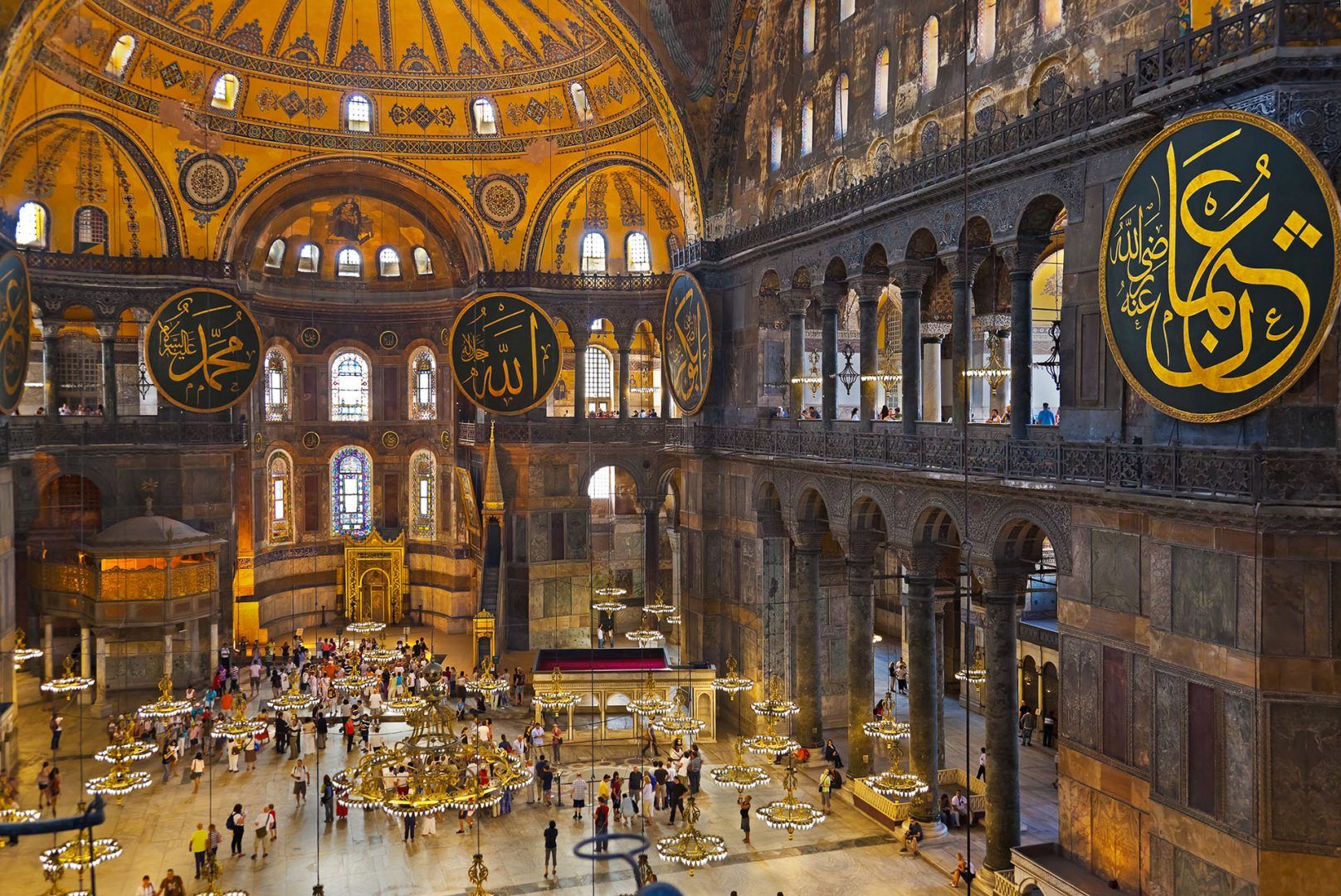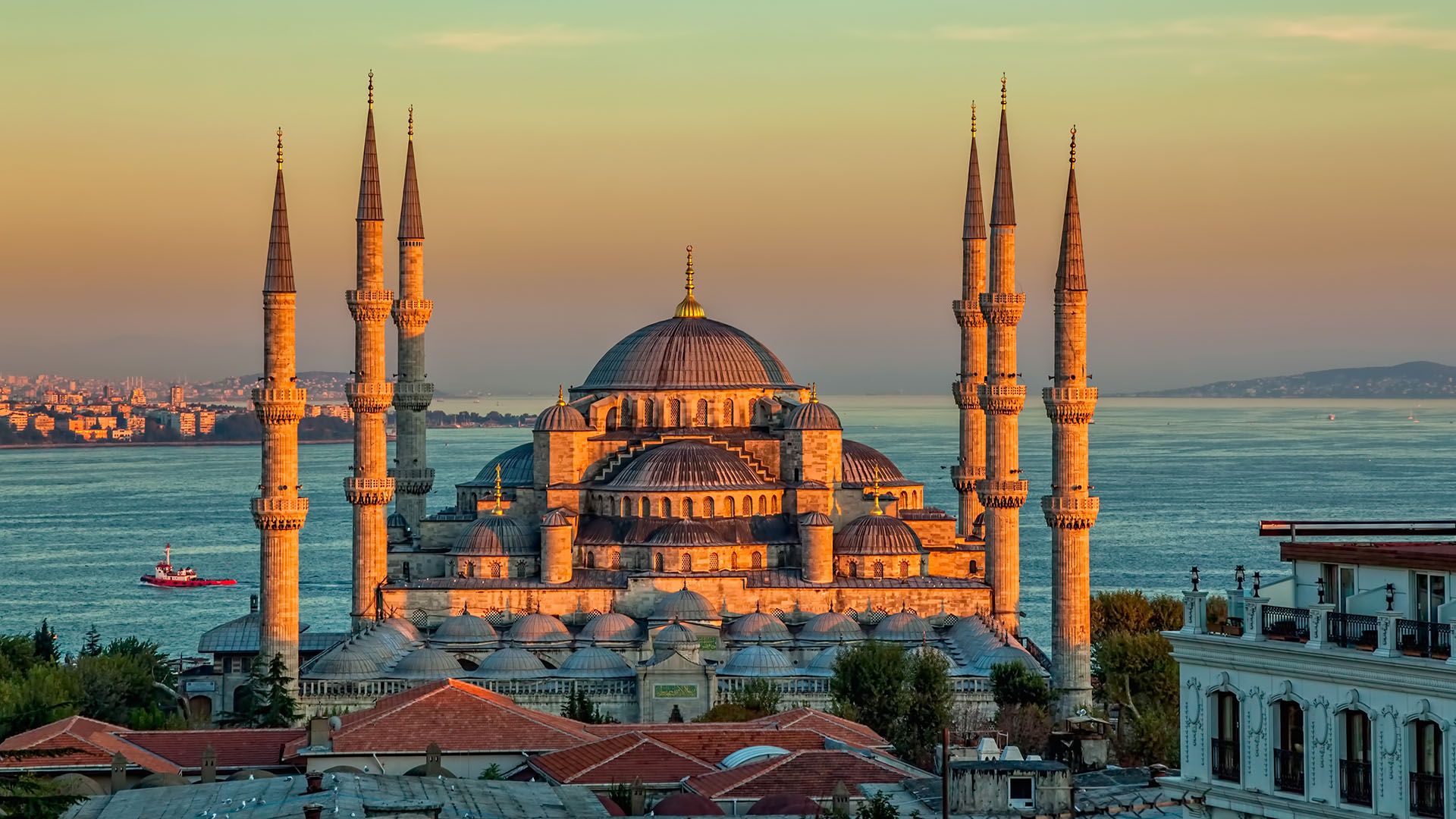Planning your own trip? Prepare for your trip
Use Rough Guides' trusted partners for great rates
Travel advice for Turkey
From travel safety to visa requirements, discover the best tips for visiting Turkey
Plan and book your private, tailor-made tour with vetted local experts
Whether you’re a history buff, foodie, art lover, or romantic traveler, Turkey's Istanbul offers timeless charm and boundless energy. It’s a city that sees ancient empires rub shoulders with the verve of modern life, and every corner reveals a story, as revealed in our guide to the best things to do in Istanbul.
Hagia Sophia is the crown jewel of Istanbul — a masterpiece that tells tales of empires, faith and architectural genius.
Originally built as a church by Emperor Justinian in 537 AD, it served as a cathedral for nearly a thousand years before becoming a mosque in 1453 under Sultan Mehmed II.
What makes Hagia Sophia extraordinary is not just its size — with its vast dome soaring above the marble floor — but its unique blend of Byzantine mosaics, Islamic calligraphy, and Ottoman additions.
As such, it’s a living, breathing monument to both Christianity and Islam, and visiting it is definitely one of the best things to do in Istanbul.
Want broader pre-trip inspiration? Read up on the best things to do in Turkey.

Visiting Hagia Sophia is one of the best things to do in Istanbul
Facing Hagia Sophia across Sultanahmet Square, the Blue Mosque is one of the most photogenic places in Istanbul.
Built between 1609 and 1616 by Sultan Ahmed I, it’s officially called the Sultan Ahmed Mosque, but nicknamed “Blue” as a result of its stunning interior of over 20,000 handmade İznik tiles in blue and turquoise.
As an active mosque, it's free to enter, but closed during the five daily prayer times, and modest dress is required (headscarves for women).
Inside, the cascading domes, stained-glass windows, and tranquil lighting create an serene atmosphere, especially during the early morning hours or just before sunset when the interior is bathed in warm light.
For more context on when to visit, read up on the best time to visit Turkey.

Blue Mosque, Istanbul © Shutterstock
Once the grand residence of the Ottoman sultans, Topkapı Palace is an opulent maze of courtyards, pavilions, and ceremonial halls perched above the Bosphorus.
Built shortly after the conquest of Constantinople in 1453, it served as the empire’s administrative and royal center for almost years.
Today, it offers a rare glimpse into imperial Ottoman life, complete with lavish treasures and holy relics.
To truly appreciate its grandeur, allow at least 2–3 hours for your visit.
Looking for someplace lavish to stay in the city? Discover the best places to stay in Istanbul.

Topkapı Palace, Istanbul © Shutterstock
Located beneath the bustling streets of Sultanahmet, the Basilica Cistern, also known as Yerebatan Sarnıcı (“Sunken Palace”) is one of Istanbul’s most atmospheric landmarks.
Built in the 6th century under Emperor Justinian I, it once stored up to 80,000 cubic meters of water for the Great Palace and surrounding buildings.
Today, it offers visitors an unforgettable journey through Byzantine engineering and eerie beauty.
The restored walkways are fully accessible and often feature art installations or light projections.
Wondering how long to visit for? Read our guide to how many days you need in Istanbul.

Grand Bazaar, Istanbul © Shutterstock
No visit to the city is complete without getting lost in the vibrant maze of Istanbul’s Grand Bazaar, one of the world’s largest and oldest covered markets.
Established in the 15th century, it sprawls over 60 covered streets and boasts more than 4,000 shops selling everything from Turkish carpets and spices to antiques, ceramics, gold, and leather.
Not rushing the Grand Bazaar is among our top Turkey travel tips for first-timers. Take your time, explore the quieter alleys, and don’t be afraid to haggle.
Steps from the Galata Bridge in the Eminönü district, the Spice Bazaar, or Mısır Çarşısı, is a vibrant 17th-century market filled with exotic aromas, vivid colors and centuries of trading history.
It's definitely a great place to sample some of the best Turkish cuisine, with shops overflowing with saffron, sumac, Turkish delight, dried fruits, herbal teas, nuts, and hand-mixed spices.
The prices are often better than those in the Grand Bazaar, and many locals still shop here for quality goods.
Beyond food, you’ll also discover natural soaps, oils, and traditional remedies, making it a great place to pick up unique gifts.

Istanbul © Shutterstock
Majestic, serene, and boasting one of Istanbul’s best panoramic views, the Süleymaniye Mosque is a masterpiece of Ottoman architecture.
Completed in 1557 by legendary architect Mimar Sinan, the complex occupies a hilltop above the Golden Horn and exudes elegance at every turn.
A quieter counterpart to the more tourist-heavy Blue Mosque, the interior is spacious and tranquil, with soft natural light and soaring arches.
Visitors can also explore the surrounding külliye, or complex, which includes a hammam, kitchen, library, and tombs of Sultan Suleiman and his wife Hürrem Sultan.

Bosphorus Bridge, Istanbul © Shutterstock
Booking a Bosphorus cruise is one of the most memorable experiences in Istanbul, not least if you’re visiting Turkey with kids.
Whether you choose a short scenic ferry ride or a longer sunset or dinner cruise, gliding along the Bosphorus Strait reveals the grand skyline, minarets, palaces and fortresses that define the city.
On a budget? Take a public ferry to see the city from the water, while a more upscale sunset cruise offers golden hour light and photo-perfect views.

Galata Tower, Istanbul © Shutterstock
Dating from 1348, the Galata Tower (Galata Kulesi) is one of Istanbul’s oldest and most striking landmarks.
Originally built by the Genoese as a watchtower, it offers an incredible 360-degree panoramic view over the Golden Horn, Bosphorus, Sultanahmet, and the sprawl of modern Istanbul.
Climb to the top (or take the elevator) and you’ll be rewarded with arguably the best urban vantage point in Turkey.
Planning a broader Turkey itinerary? Read up on getting around Turkey.
A dazzling showpiece of 19th-century European opulence on the shores of the Bosphorus, the Dolmabahçe Palace is where the Ottoman Empire made its grand exit.
Built between 1843 and 1856 under Sultan Abdülmecid I, it replaced Topkapı as the main imperial residence and reflects a shift in taste from traditional Ottoman to Baroque, Rococo, and Neoclassical styles.
With 285 rooms, 46 halls, and 6 hammams, Dolmabahçe is a monument to luxury, and also holds deep historical significance — it’s where Mustafa Kemal Atatürk, founder of modern Turkey, died in 1938. His room has been preserved exactly as it was, with the clock frozen at 9.05 — the moment of his passing.
Like to dig deeper into your vacation destinations? Find out some fun facts about Turkey.

Chora Church, Istanbul © Shutterstock
Tucked away in the Edirnekapı district, away from Istanbul’s main tourist path, lies the hidden treasure of Chora Church, also known today as the Kariye Mosque.
Housing some of the most exquisite mosaics and frescoes in the Christian world, this Byzantine gem offers a vibrant visual journey through New Testament stories.
Visit in the morning for a quieter experience, and pair your trip with a stroll through the historic city walls or a Turkish coffee in a nearby courtyard.

© Shutterstock
Nestled along the Golden Horn, the neighborhoods of Balat and Fener offer immersive insights into Istanbul’s multicultural, bohemian spirit.
Once home to the city’s Jewish, Greek Orthodox, and Armenian communities, these streets now tell stories through colorful houses, hidden synagogues, Greek schools and crumbling churches.
Balat is particularly famous for its vibrantly painted homes and trendy cafes, while Fener is home to the Greek Orthodox Patriarchate and the striking Phanar Greek Orthodox College.
Spend a day here exploring antique shops, sipping Turkish tea, and admiring street art and murals that reflect the district’s contemporary soul.

Rumeli fortress, Turkey © Tatiana Popova/Shutterstock
Stretching for almost 1.5 kilometers through modern Istanbul, İstiklal Avenue (İstiklal Caddesi) is a dynamic pedestrian boulevard in which history, youth culture and cosmopolitan flair collide.
Lined with 19th-century buildings, trendy boutiques, art galleries, theaters, and eateries, it pulses with energy day and night.
For a peaceful escape from Istanbul’s urban buzz, take a ferry across the Marmara Sea to the Princes’ Islands — an archipelago of nine car-free islands where time seems to slow down.
The most popular of these are Büyükada (Big Island), Heybeliada, Burgazada and Kınalıada.
Once Byzantine exile sites for royalty, and later summer retreats for Istanbul’s elite, today, the islands are beloved for their Victorian mansions, pine forests and hidden coves

Classic Turkish hammam © Mr. Tempter/Shutterstock
No trip to Istanbul is complete without indulging in the steamy ritual of a Turkish hammam — a centuries-old tradition that’s equal parts cultural immersion and physical renewal.
Rooted in Roman bath culture and refined by the Ottomans, a typical hammam visit begins with time in a heated marble steam room, followed by a vigorous kese (exfoliation scrub) and a bubble massage under a domed ceiling.
The cleansing is thorough and invigorating, leaving skin glowing and muscles relaxed.
Many hammams also offer oil massages, facials, and private rooms.
In the process of planning a trip to Turkey? Make use of our guide to how to plan a trip to Turkey.
Don't enjoy planning? Contact our local Turkey travel experts to have them curate your perfect Turkey itinerary for any duration, whether you're limited to a 7 days Turkey itinerary, or can extend your vacation to a 10 days Turkey itinerary.
written by
Joanne Owen
updated 28.05.2025
Joanne is a Pembrokeshire-born writer with a passion for the nature, cultures and histories of the Caribbean region, especially Dominica. Also passionate about inspiring a love of adventure in young people, she’s the author of several books for children and young adults, hosts international writing workshops, and has written articles on the Caribbean and inspirational community initiatives for Rough Guides. Follow her @JoanneOwen on Twitter and @joanneowenwrites on Instagram.
Use Rough Guides' trusted partners for great rates
From travel safety to visa requirements, discover the best tips for visiting Turkey
Discover Turkey's most captivating stories